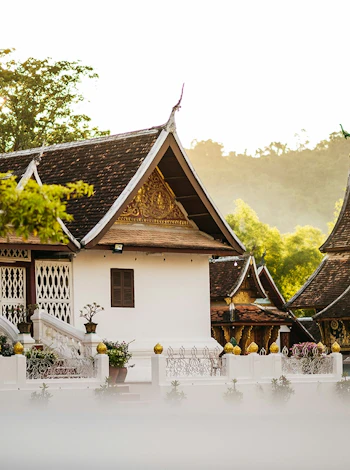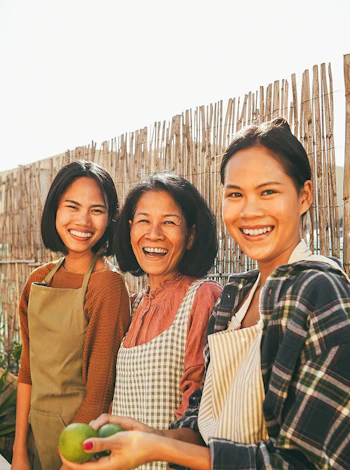High school exchange program in Thailand
Immerse yourself in the Thai culture and way of life, studying at a local high school and living with a Thai host family.






Experience life in the Land of Smiles
Student exchange program in Thailand
Experience Thailand’s charming natural beauty, fascinating history, unique culture and friendly people during your exchange program to the heart of Southeast Asia. You will be fully immersed into the Thai culture, gaining insight into the country’s customs and traditions, and learning some Thai while building meaningful friendships along the way!
The word Thailand means "land of the free" and in truth, Thailand is the only country in Southeast Asia to have never been colonised. Home to nearly 67 million inhabitants, Thailand is often referred to as "the Land of Smiles" and is renowned for a warm and welcoming culture.
Discover this unique destination during your exchange program and try on a new way of life!

Thailand: a feast for the senses
Cuisine
Food is very important to the Thai culture! In fact, many people greet others with the phrase "Gin Khao Yung", meaning "have you eaten yet?". Eating alone is considered bad luck, so dishes are often shared amongst family and friends. Almost every Thai dish combines all four tastes, sweet, salty, spicy and sour!
What’s high school like in Thailand?
Different calendar
The school calendar in Thailand is very different to Australia, running from May to March with a break in March-April (this usually coincides with the hottest and driest time of year, with temperatures averaging the high 30°Cs!).
Government and private
The education system in Thailand includes government, private and international schools. Exchange students are usually enrolled in regular government schools, many of which offer bilingual English-Thai class which can be joined for an extra fee.
Pride and patriotism
Whilst classes usually start around 8:10 am, all students must be at school by 8:00, in time to sing the national anthem and watch the raising of the Thai flag. Uniforms are worn by students at every level, and they take them very seriously.
New friendships
Friendship plays a big role in Thai culture. A true friendship is for life – you will quickly make new friends in your school community and share your classes and afternoon activities with them.
A small country of great beauty – let it surprise you with an exchange experience!
Choose authenticity – trust WEP and prepare to be amazed.
On a WEP Classic program, you will experience the true Thailand. You may be placed anywhere in the country, depending on the location of the host family who has chosen you to share this incredible adventure with.
Volunteer host family
Public school
Placement anywhere in Thailand
Semester or year programs available
Your host family during your exchange year
Gain a second family – they can’t wait to welcome you into their lives!
Here is why:
Thais are taught that in their role as a family member, they should give warmth, support and generosity to each other. Their culture values serenity and social harmony - the famous 'sanuk' concept (emphasising the idea that life should be fund) will win you over.
Traditionally, Thai families are large and see multiple generations living under the same roof. While this may no longer be the case in modern Thai society, Thai families continue to promote traditional values and cultural practices, which they are very open to sharing with visitors.
Your host family will be at your side during your Thai adventure. Whether it’s to help you learn their language, navigate any school requirements, or simply give you a hug if you’re feeling homesick, they are there to help you integrate. Don’t hesitate to lean on them!


Your school in Thailand
Find out more about your Thai school experience
Thailand schooling is characterised by a 12-year education system, comprising of six years of primary education (Prathom 1-6) and six years of secondary education (Matthayom 1-6), further divided into lower secondary school (ages 13-15, grades 7-9) and senior secondary school (ages 16-18, grades 10-12).
All Thai public schools follow the Thai National Curriculum, established and regulated by the Thai Ministry of Education and taught in the Thai language.
The Thai education system
Upper secondary school students typically learn eight core subjects with a few elective options. The compulsory subjects are Thai, mathematics, science, social studies, religion and culture, health, PE and arts. Elective subjects typically fall into four categories: foreign languages (English, Japanese, French, Chinese...), social sciences (history, geography, economics, political science...), vocational/technical fields (computer science, business, engineering...), and arts (visual arts, performing arts...).
Subjects in Thailand
Matthayom 4-6, or upper secondary school, spans three years and offers both vocational and academic streams. Students in Matthayom 4-6 tend to be focused and committed to their studies, as they prepare for tertiary education or figure out their next steps. Homework is a common feature and students often have daily assignments to complete at home before the next day.
Once students complete Matthayom 6, they can head to university, enrol in a vocational college, or enter the workforce.
Thai secondary school
The availability of extra-curricular activities depends on the size and location of each school. Larger schools tend to have more choices available to students, while smaller or more remote institutions can have a limited choice. Common activities include sports (with the most popular options being soccer, badminton or traditional Thai sports), art, drama, dance, music, and academic clubs. Students are encouraged to take part to develop their talents, leadership skills and teamwork abilities.
Usually there are also private art, music or sport academies in the community that students can enroll in at an extra cost.
Extra-curricular activities
The Thai school year consists of two terms, the first starting in early May until late September, and the second from mid-October until the end of February. The longest break takes place during March and April (known as summer break, as this is often the warmest time of the year!) and there is a shorter mid-year break in October.
In addition to these breaks, there are several public and government holidays that are observed by all schools and offer a blend of cultural, religious, and national celebrations. A few examples are included below:
- Makha Bucha: falling on the full moon of the third lunar month, this religious celebration marks Lord Buddha’s teachings to his disciples.
- Chakri Memorial Day: 6th April, to honour the kings of the Chakri dynasty, with many Thais visiting the Royal Palace temple and placing flowers on statues of King Rama I around the country.
- Songkran: the Thai New Year, traditionally celebrated for three days starting from the first full moon in April.
- Coronation Day 4th May, to commemorate the coronation of King Rama.
- Queen's Birthday: 12th August, to celebrate the birth of the Queen of Thailand, Queen Suthida, with citizens waving the country's flag and pictures of her.
- Constitution Day: 10th December, commemorating Thailand's adoption of a constitution in 1932.
The school calendar
The grading system in Thai upper secondary schools (grades 10-12) is designed to assess students’ academic performance through a combination of letters, descriptive terms, and numerical values. Depending on the school, grades may either be given on a A to F scale, or a 4 to 1 scale, with F and 1 representing a fail.
Grades in Thailand
Stories from students and parents who have been there
Here are the testimonials of families who have chosen WEP for their exchange experience.
Join one of our upcoming events
to learn everything there is to know
about our high school exchange programs!
Going with WEP is best
Since 1988, a wide choice of destinations and comprehensive assistance before, during and after your overseas program. WEP is the ideal partner for your big overseas adventure.
Like you, we also get to choose who we travel with: our schools, host families and overseas partner organisations are carefully selected.
We offer a custom-made insurance policy, specifically designed for our participants, and we have a solid network behind us.
Emergency assistance, overseas and from Australia, is available 7 days out of 7, 24 hours a day, 365 days a year.
Allowing all our participants to live their desired overseas experience is a mission, a challenge we're thrilled to accept.
FAQ
Your host family, local coordinator and your host organisation will provide you with support while you are overseas. WEP Australia will remain in contact with the host organisation and your parents to coordinate and support your experience. In case of an emergency, both you and your family will be able to call an emergency phone number that is answered 24/7.
You will be advised of your placement location, host family and host school as soon as feasible. This can range from a few months prior to departure, right up until departure, as a lot needs to happen behind the scenes before each student's placement process is complete and can be communicated to you with certainty. The placement process doesn't only include sourcing a suitable host family, but also finding availability at a local school, and completing all red tape (including, for example, lenghty criminal history checks in some countries). Prior to departure from Australia, all students will receive host family, host school and local coordinator details.
Independent travel is not permissible while on exchange. However, you will be able to travel with your host family, school, host organisation and other community groups such as sporting teams or scouts. Again, the foremost aim of the program is educational, and your priority for any holiday periods must be your host family, who will be investing a lot of time, energy and money into this experience - simply in return for your frienship and positive contribution to their household.
Generally speaking, overseas schools won't issue a diploma to exchange students who are only there for a short time and don't graduate at that school. You may however be provided with a honorary certificate, as well as a WEP certificate of completion, which however don't count towards credit or graduation in Australia.
Language experience is desirable, but not necessary, for most countries. However, some countries have mandatory language requirements. You'll find the specific requirements for each country listed on its page. Intensive language courses may, in some circumstances, meet language pre-requisites. WEP strongly recommends language preparation prior to departure as language knowledge is of enormous benefit in assisting you to quickly adapt to your new family, school and life.
Of course, there are English-speaking destinations available if you are not interested in learning another language.
No, it's the host families who choose the student they wish to invite into their home. Based on the documents you will submit as part of your WEP application, one lucky family will choose to open their home and hearts to you, which is why for all Exchange Classic programs, and many Flex programs as well, there is no avenue for students to choose a specific location.
It may be possible to live with an overseas family that you already know (excluding relatives of the student). However, the family will have to be screened and approved, prepared and supported by our partner organisation in the same manner as any other host family. School enrolment must also be available.
More questions?


